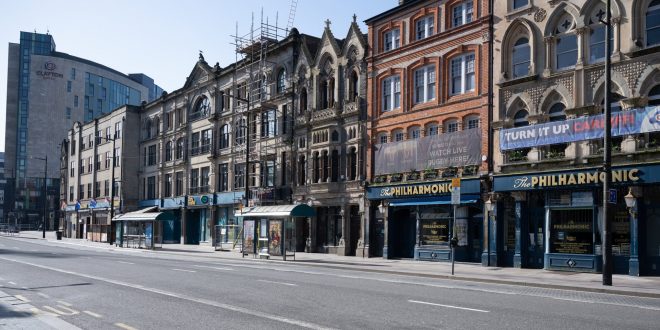World leaders deliver joint statement seeking to calm fears of global depression
The world’s seven key western economies have sought to calm mounting fears of a global depression by pledging to do whatever it takes to get through the coronavirus pandemic, after early warning signs showed the steepest plunge in business activity on record in Britain, Japan and the eurozone.
As more countries effectively shut down large parts of their economies to contain the spread of the virus, the G7 said it would take further steps to coordinate the fightback against the economic meltdown.
Issuing a joint statement following criticism of some world leaders over the lack of a united response to the unfolding crisis, the group of wealthy nations said: “We will do whatever is necessary to restore confidence and economic growth and to protect jobs, businesses, and the resilience of the financial system.”
Finance ministries across the group – comprised of Canada, France, Germany, Italy, Japan, the US and the UK – will coordinate weekly and promised to take further measures when needed to cushion the economic blow, according to the statement, while policies to support jobs and growth will be used for as long as necessary.
“We also pledge to promote global trade and investment to underpin prosperity. Our nations are working together to fight the Covid-19 outbreak and mitigate its impact, treat those affected, and prevent further transmission,” the G7 said.
The intervention comes as closely-watched surveys of business activity revealed the early economic damage from the rapidly escalating crisis. The purchasing managers indices (PMI) – which provide snapshots of business activity – for the UK, Japan and the eurozone plunged to the lowest levels since PMI records for those economies began. The UK PMIs date back to 1996, with those for eurozone countries launching in 1998 and Japan’s starting in 2007.
The flash PMI for the UK’s dominant service sector – which includes restaurants, hotels and banks, and accounts for about 80% of the UK economy – crashed to 35.7 on an index where anything below 50 represents contraction.
The collapse on the index, which is closely monitored by the Treasury and the Bank of England, outstripped the slump recorded during the depths of the 2008-2009 financial crisis, as emergency public health measures disrupt supply chains and demand for goods and services evaporates.
Surveys in the US showed private sector activity contracting at the fastest rate since the depths of the financial crisis in 2009, while activity across the eurozone crashed by the greatest extent ever recorded by the data firm IHS Markit, which compiles the surveys. Preluding a deep recession around the world, Germany and France plunged to record-low levels.
Activity in Japan’s service sector also dropped by the most since its PMI records began. Economists warned that the reading was especially worrying given that, apart from school closures, there had been no major European-style lockdowns put in place, indicating that the collapse in activity in Europe could worsen over the coming weeks.
Chris Williamson, chief business economist at IHS Markit, said the virus-fighting lockdowns meant the US economy, the world’s biggest, was probably already in a recession. “Jobs are already being slashed at a pace not witnessed since the global financial crisis,” he added.
Despite the worsening economic outlook stock markets rallied on Tuesday to halt a plunge in recent weeks, as hopes mount for greater coordination between the world’s biggest economic superpowers. There are also hopes of a boost for economic activity in China, where there are plans to lift travel restrictions in the central Hubei province where the Covid-19 outbreak originated late last year.
Stocks on Wall Street surged with the Dow Jones index of leading US firms rising by more than 1,000 points, or around 7%, to stage a fightback from the heavy losses on global markets in recent weeks. The Dow remains around the same levels as in early 2017 when Donald Trump first entered office, having collapsed by more than 8,000 points since the start of the year.
In London, the FTSE 100 was up 6.5%, with oil and mining companies and hospitality groups among the biggest risers. Carnival, the cruise operator, leapt by more than 25% to claw back some of the losses sustained since the outbreak spread around the world. Shares in the company are still down by more than 70% this year after some of its ships were put into quarantine.
The rally in the US and Europe followed gains in Asia overnight, after Japan’s Nikkei jumped 7.1%, the South Korean Kospi rose 8.6%, and the New Zealand market gained 7.18%. Hong Kong’s Hang Seng closed 4.46% higher, the Australian market rose 4.17% and the Shanghai stock exchange finished 2.34% higher.
The rebound comes after surprise intervention from the US Federal Reserve on Monday, when the American central bank pledged to buy as much government-backed debt as needed to keep financial markets functioning.
The Guardian
 Lebanese Ministry of Information
Lebanese Ministry of Information



